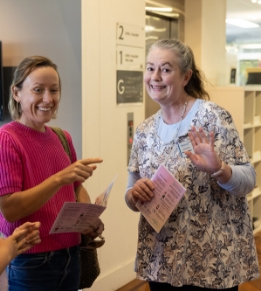Talking Tapa: Pacifika Bark Cloth in Queensland
Showcasing the diversity of pacific islander cultural practices and imagery represented by tapa or bark cloth.
Talking Tapa: Pasifika Bark Cloth in Queensland is a traveling exhibition that showcases Pacific Islander heritage. With a growing number of Pacific Islanders settling in Australia and an increasing awareness of Australia’s Pacific neighbours, it is timely that a major exhibition of tapa (hand made bark cloth) has been developed and is now touring across Queensland, New South Wales and Victoria.
Tapa is synonymous with the Pacific Islands, however now plays a significant part in Australian cultural traditions. Tapa’s physical qualities and uses vary greatly throughout the Pacific, from utilitarian and everyday use for clothing, mats, blankets and as a unit of currency, to extensive ceremonial purposes in weddings, funerals and initiations. Tapa now appears regularly in meeting halls, at performances, weddings and funerals and in the homes of these relatively new migrants to our shores.
In the exhibition, Fijian wedding outfits vie with Papuan New Guinean ceremonial skirts and cloaks and unusual tapa clothing from Wallis and Futuna. Very large Tongan pieces serve many functions and have been passed from family to family, depending on needs within the Pacific Diaspora. Loincloths and headdresses from the Solomon Islands and bark cloth lengths from Erromongo, Vanuatu remind us of those ‘blackbirded’ labour recruits of yesteryear, whose descendants now form a significant community in Queensland.
While most tapa is made from the inner bark (bast) of the paper mulberry tree, fig and breadfruit are also represented in this exhibition. The oldest bark cloth in the show is from Futuna Island and dates from the 1860s, whilst the latest was acquired in the Solomons in September 2008. Tapa decoration draws on clan and family patterning, the spirit world, the plant, bird, animal and fish kingdoms, abstract and geometric designs, as well as historical events and representations.
Talking Tapa offers an opportunity to view traditional and contemporary Pasifika design and to learn more about Australia’s Pacific neighbours and migrant communities. There is a comprehensive 88 page full-colour catalogue and extensive didactic panels that draw on the cultural knowledge of Pasifika communities and scholarly research to place each work in its social and historical context.
This is a national traveling exhibition presented by Brisbane Multicultural Arts Centre and supported by Visions Australia.

